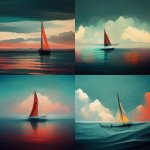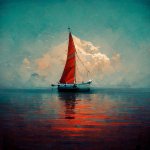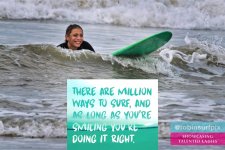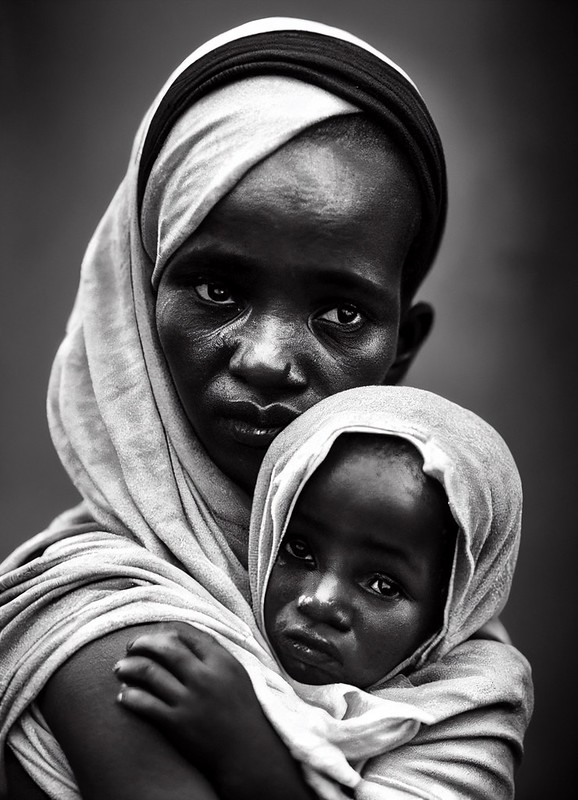- Messages
- 3,688
- Edit My Images
- Yes
That video is truly amazing !
The idea that the new replaces the old seems to be a perennial misconception, the new adds to the old, chemical photography did not replace painting, digital photography did not replace chemical photography, AI generated photography will not replace digital photography.
I think you might be confusing art with craft, as well as opening up a debate on what a "good" image is.I see you point but photography or at least getting good images used be seen as a black art practiced by people with a lot of interest/ knowledge/skill in the subject but we are getting to the point where any knowledge or skills will not be required, thus photography will no longer be seen as and art form requiring skill or knowledge so photos from anyone still practicing it the old way will be lost in the mire of Key board heroes images and not appreciated at all. The usual response now when someone sees an image of mine and likes it is wow you must have a good camera not wow you good at that ( not for a second saying I'm particularly good !)
Adams worked with the very earliest digital camera prototypes that Kodak developed.I was more so referring to what is known as the art of photography rather than art it's self,. The art of photography as you say being more really a craft which I agree with Graham. The Ansel Adams quote proves he was either a very intelligent man to see exactly what was coming or maybe him being regarded at a very high level allowed him to see forth coming technology that was not seen by the many.
we are getting to the point where any knowledge or skills will not be required,
A lot of innovative art has been created by people using technology which is too new for anyone to have developed a 'correct' way of using it. Particularly electronic music making. Experimentation generates creativity. The same can apply when taking up a new medium for the first time, when you don't know the 'rules' of its use.While I instinctively believe you can have craft without art, but you cannot have art without craft, I'm not entirely sure this is necessarily correct.
While believing my statement is a good generalisation. My hesitation in it being some sort of absolute rule (I'm not keen on any absolutes) was thinking about an artist becoming aware of a mediums potential, and producing worthwhile work, before necessarily mastering it. Edit: when I say mastering I mean "fit for purpose" ie mastered sufficiently to achieve what the artist wants to achieve.A lot of innovative art has been created by people using technology which is too new for anyone to have developed a 'correct' way of using it. Particularly electronic music making. Experimentation generates creativity. The same can apply when taking up a new medium for the first time, when you don't know the 'rules' of its use.
“It took me four years to paint like Raphael, but a lifetime to paint like a child.”
Pablo Picasso
Edit: when I say mastering I mean "fit for purpose" ie mastered sufficiently to achieve what the artist wants to achieve.
Some conceptual art depends on the creation of a set of rules to follow!But in art don't the rules eventually follow the practice, rather than the art being constrained by the rules.
That's interesting, can you give an example.Some conceptual art depends on the creation of a set of rules to follow!
A simple example is my own Gone Out series.That's interesting, can you give an example.
Ah, OK.A simple example is my own Gone Out series.
The 'rule' was; take one photograph of every dry patch caused by a car keeping rain off the ground on a walk from home to the village Post Office and back using the camera in Auto mode. I didn;t pick and choose teh most photogenic dry patches, I had no control over focusing or aperture. The idea was the work. If it works as a series of pictures, or any individual pictures work on their own, wasn't what it was about. It was chance that there were 20 patches. If I had known this, or planned in advance, I would proably have shot for redundancy - taking one vertical and one horizontal picture of each patch in order to make a grid, or just for consistancy. But I didn't. I framed each shot in the orientation which immediately felt right.
Gone Out
A more com[plex example (which is where I first became aware of the idea of setting rules before making work, or creating systems, to make work) is Brian Eno's Music For Airports. Wikipedia has a brief description of the process - https://en.wikipedia.org/wiki/Ambient_1:_Music_for_Airports#Recording_and_composition
Some more here - https://reverbmachine.com/blog/deconstructing-brian-eno-music-for-airports/
Using systems or 'rules' takes some of the control out of the artist's hands, relying on chance to create the unexpected. Something frowned upon by a lot of hobbyist photographers and 'Sunday painters'!
And the breaking of 'rules'?Setting personal constraints (rules), and "creating" circumstances that can generate serendipitous results, I see as ways of encouraging, exploring and developing personal creativity.

I'm actually rather keen on learning your craft, but nothing to do with rules and everything to do with giving you the freedom and confidence to make choices.And the breaking of 'rules'?
In my series I was breaking the golden 'rules' I've read on here of always being in control of focus points, shutter speed and aperture in order to be creative. More than once I've seen comments railing against letting cameras select focus points. Although these days a lot of people seem to be lost unless their cameras have face and eye detect focusing!
I've always liked making it up as I go along.I'm actually rather keen on learning your craft, but nothing to do with rules and everything to do with giving you the freedom and confidence to make choices.
That's fine as wellI've always liked making it up as I go along.
Well, there is no 'right' way to do things.That's fine as well
Thats pretty cool, i like thatThis AI site called Deep Dream Generator is surreal.
deepdreamgenerator
Here is a before and after
Original
View attachment 362570
After AI
View attachment 362571


I don't know about that but I can just imagine the gleeful rubbing of hands among lawyers contemplating copyright disputes galore!Pretty amazing stuff.

Totally agree. But I fear it's coming.It is amazing. That's actually a very pretty image. But a photo it ain't. If this stuff becomes mainstream photography will be dead. Because the whole point of it is getting out there and seeing it with your own eye. It's rather sobering to think that the images AI produces will be done without any feeling or artistic interpretation.
You are way out of touch. When researching the history of my camera club we found a poster for a lecture on how to change a sky in a landscape shot. This was in 1928 long before digital cameras. Ansel Adams also changed skies and modified skies using chemicals. Having said that I am not keen on changing skies, and it rarely produces the ideal effect.I suspect it'll lead to all sorts of legal issues at some point in time Copywrite of something created by a computer. Two people using similar images might get the exact same result (I'm guessing)
I can see the point of say noise reduction learning, but once it starts adding skys or mountains I'm out. Come back film, all is forgotten.
Was it the tweed Ulster coat, swordstick and deerstalker hat that gave me away?You are way out of touch. When researching the history of my camera club we found a poster for a lecture on how to change a sky in a landscape shot. This was in 1928 long before digital cameras. Ansel Adams also changed skies and modified skies using chemicals. Having said that I am not keen on changing skies, and it rarely produces the ideal effect.
Dave
Perhaps it was the misunderstanding of what you wrote.Was it the tweed Ulster coat, swordstick and deerstalker hat that gave me away?
....Absolutely!Well, there is no 'right' way to do things.


.... But AI can be merely used as one of many tools available to the author when post-processing RAW images.It is amazing. That's actually a very pretty image. But a photo it ain't. If this stuff becomes mainstream photography will be dead. Because the whole point of it is getting out there and seeing it with your own eye. It's rather sobering to think that the images AI produces will be done without any feeling or artistic interpretation.
.... But AI can be merely used as one of many tools available to the author when post-processing RAW images.
AI also can save loads of valuable workflow time in the tedium of manually creating masks (in ON1 2023). No-one has to use it but it can be very helpful in creating your final picture. Taking a photograph with a camera is merely the first (essential and fundamental) step.
I shoot any number between 200 and 2,000 RAW images a week every week and greatly value what AI can offer in my post-processing workflow. It even comes down to just using ON1 Resize AI because a customer wants a giant print for a wall.
I shoot on OM System Pro gear (Olympus).
That's the "When I was a kid it was always sunny and only rained on the days when I wanted to stay in and play with my train set" syndrome.The trouble is, as I see it, it's distorting reality. They will forget the bad weather and look fondly on the fantasy.

.... I am not a professional and personally I don't think it matters what any snapper does with a camera or, more likely, a mobile phone camera. Why should we care if someone else distorts their reality. A certain amount of fantasy is healthy IMO [says Robin who lives in a bubble].I think you have a point. There's a compelling argument for its use in a professional capacity. But, for every professional there is likely to be a hundred people who had a terrible holiday and want an imaginary photo of how they imagined it to be. The trouble is, as I see it, it's distorting reality. They will forget the bad weather and look fondly on the fantasy.


.... Your comment suggests that you may not fully realise how AI can be a very real aid in enhancing or even amplifying the emotion a photographer captures on camera and consequently wishes to convey. AI is simply another tool in a photographer's arsenal.Is today's AI capable of capturing the human condition? So much of what I've seen seems to be beautifully rendered computer generated art, much as you'd see on a modern video game. Is it capable of capturing emotion? Can today's computers generate anything close to something like this?
Portrait by Adrian Day, on Flickr
Is today's AI capable of capturing the human condition?
